人教版高中英语【必修三】[知识点整理及重点题型梳理] 同位语从句
人教版高中英语必修三语法总结

人教版高中英语必修三语法总结高中英语必修三语法主要考点有情态动词、名词性从句、同位语从句等,下面是具体的高中英语必修三语法,仅供参考。
1英语必修三有哪些语法要学考点一情态动词(unit1,unit2)一、情态动词的特点:1.没有人称和数的变化。
2.有些情态动词有过去式的变化:e.g.will→would,can→could,may→might,dare→dared二、情态动词的否定式:情态动词+not+动词原形cannot:can’t,mustnot:mustn’t,neednot:needn’t三、情态动词的用法及相互区别,是考试的内容之一1.can,beabletobeableto表示经过努力后,能够做到;beableto有多种形式的变化。
can1).表示体力或脑力方面的能力;2).表示允许、可能性。
could是can的过去式,表示过去有能力及过去存在的可能性;用于疑问句表示委婉地提出问题。
1)Thefirespreadthroughthehotelveryquicklybuteveryone____getout.(NMET97)A.hadtoB.wouldC.couldD.wasableto2)-Willyoustayforlunch?-Sorry,__.Mybrotheriscomingtoseeme.(NMET99)A.Imustn’tB.Ican’tC.Ineedn’tD.Iwon’t2.may表示询问或说明一件事可不可做;表示某事有可能发生。
might是may的过去式;用在疑问中比may委婉、客气。
1)-MayItakethisbookoutofthereading-room?-No,youmustn’t.(Yes,youmay.)2)-MightImakeasuggestion?-Yes,youmay.3.must1).表示必须要做的事:必须2)表示很有把握的推断:一定,准是。
have(has)to:have(has)gotto必须,不得不。
高中英语知识点归纳同位语从句的用法和标点
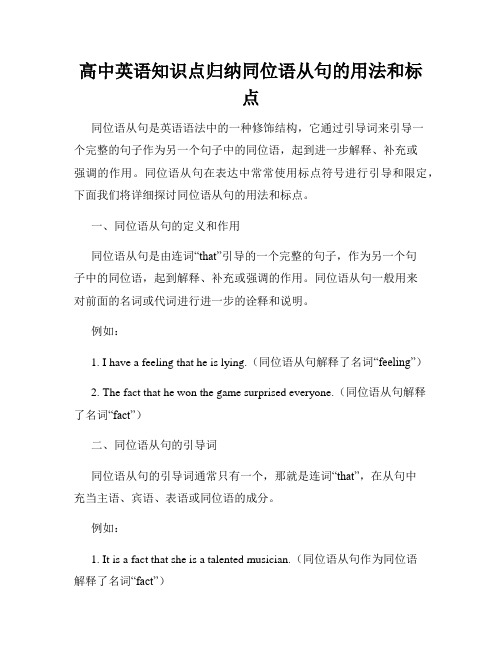
高中英语知识点归纳同位语从句的用法和标点同位语从句是英语语法中的一种修饰结构,它通过引导词来引导一个完整的句子作为另一个句子中的同位语,起到进一步解释、补充或强调的作用。
同位语从句在表达中常常使用标点符号进行引导和限定,下面我们将详细探讨同位语从句的用法和标点。
一、同位语从句的定义和作用同位语从句是由连词“that”引导的一个完整的句子,作为另一个句子中的同位语,起到解释、补充或强调的作用。
同位语从句一般用来对前面的名词或代词进行进一步的诠释和说明。
例如:1. I have a feeling that he is lying.(同位语从句解释了名词“feeling”)2. The fact that he won the game surprised everyone.(同位语从句解释了名词“fact”)二、同位语从句的引导词同位语从句的引导词通常只有一个,那就是连词“that”,在从句中充当主语、宾语、表语或同位语的成分。
例如:1. It is a fact that she is a talented musician.(同位语从句作为同位语解释了名词“fact”)2. The teacher said that we need to study harder.(同位语从句作为宾语解释了动词“said”)三、同位语从句的标点同位语从句的标点主要是通过逗号或冒号进行引导和限定。
具体使用哪种标点符号,取决于同位语从句的位置和上下文的语气。
1. 当同位语从句与先行词之间具有较强的逻辑关系,且从句不易省略时,通常用逗号进行分隔。
例如:1. The news, that he got admitted to Harvard, made his parents proud.2. The fact, that she is always late for class, annoys the teacher.2. 当同位语从句与先行词之间的逻辑关系较弱,且从句比较长、独立性较强时,通常用冒号进行分隔。
人教版高中英语必修三导学提纲:U5 Grammar同位语从句

Unit 5 Canada—“The True North”Appositive Clause(同位语从句)导学提纲Designer: Feng Huilan Supervisors:Teachers in senior 1班级:组名:姓名:使用时间:2018. 04.【学习目标】 1. Get students to know about Appositive Clause.2. To know the difference between Appositive Clause and Attributive Clause.一、了解感知(Learn by yourself)1. What is the appositive? What is appositive clause? ——导2. Underline the appositive clauses and fill in the blanks. ——思1) The thought that they would cross the whole continent was exciting.2) Some people have the idea that you can cross Canada in less than five days .3) They forget the fact that Canada is 5.500 kilometres from coast to coast.4) The girls were surprised at the fact that ocean ships can sail up the Great Lakes.5) The question whether we need more time to do the work is not clear.6) I have no idea when he will come back.总结:同位语从句引导词分为:从属连词__________________ ,连接代词__________________,连接副词_____________________,常放在一些抽象名词后面,如___________________________, truth, hope, problem, information, wish,promise, answer, evidence, report, explanation, suggestion, conclusion等,解释说明该名词的具体内容。
人教高中英语必修3Unit5同位语从句(共18张PPT)

(2) 用whether不用if
(3) 其他特殊疑问词
【注意】doubt+ whether; no doubt + that
(1)They were all very much worried over the
fact_t_h_a_t_ you were sick.
(2)He made a proposal t_h__a_t_ the meeting be put
off. (3) I have
no
idea
w__h_y_
he
was
late.
(4)We are looking into the question w__h__e_t_h_e__rhe is
worth trusting.
(5) I have the doubt w__h_e_t_h_e_rhe will come.
forward.
B
A. what B. that C. when D. as
(3)She heard a terrible noise,____
brought her heart into her
mouth.(MET91)
B
A. it B. which
C. this D. that
考例 They have no idea at all _____ .
A where has he gone B where did he go C which place he has gone D D where he has gone
考例:Along with the letter was his
promise _____ he would visit me this
新教材人教版高中英语必修第三册全册书重点单词短语句型汇总(2022新高考一轮复习资料)
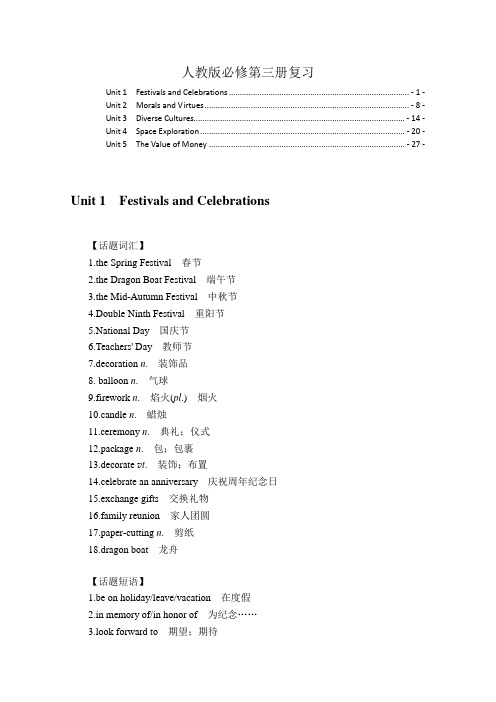
人教版必修第三册复习Unit 1Festivals and Celebrations .................................................................................. - 1 - Unit 2Morals and Virtues ............................................................................................. - 8 - Unit 3Diverse Cultures................................................................................................ - 14 - Unit 4Space Exploration ............................................................................................. - 20 - Unit 5The Value of Money ......................................................................................... - 27 -Unit 1Festivals and Celebrations【话题词汇】1.the Spring Festival 春节2.the Dragon Boat Festival 端午节3.the Mid-Autumn Festival 中秋节4.Double Ninth Festival 重阳节5.National Day 国庆节6.Teachers' Day 教师节7.decoration n. 装饰品8. balloon n. 气球9.firework n. 焰火(pl.) 烟火10.candle n. 蜡烛11.ceremony n. 典礼;仪式12.package n. 包;包裹13.decorate v t. 装饰;布置14.celebrate an anniversary 庆祝周年纪念日15.exchange gifts 交换礼物16.family reunion 家人团圆17.paper-cutting n. 剪纸18.dragon boat 龙舟【话题短语】1.be on holiday/leave/vacation 在度假2.in memory of/in honor of 为纪念……3.look forward to 期望;期待4.dress up 打扮;装扮5.turn up 出现;到场6.celebrate the festival 庆祝节日7.have fun with 玩得开心8.of good/poor quality 质量好/坏9.a display of fireworks 烟火表演10.hold one's breath 屏息;屏气【话题佳句】1.What we love most is the time when the whole family enjoy the full moon together.我们最喜爱的是一家人一起赏满月的时刻。
人教版高中英语必修三同位语从句

同位语从句编稿:张桂琴审稿:梁晓概念引入:1 I have a dream that one day, all roads will be made plain.我梦想着总有一天所有的道路都是平坦的。
2 We hold this truth to be self-evident that all men are created equal.我们认为这些真理都是不言自明的,所有的人生来都是平等的3 Some people hold the opinion that the Internet is a curse.有些人持这种观点,互联网是一种诅咒。
4 Museums play a role of education for the simple reason that they provide people with a good opportunity to have a deeper understanding of their own country's tradition and cultures.博物馆发挥教育的作用,原因很简单,他们为人们提供一个很好的机会,对自己国家的传统和文化有更深的了解。
语法讲解一、在复合句中用作同位语的从句叫同位语从句。
它一般跟在某些名词后面,用以说明该名词表示的具体内容。
I heard the news that our team had won.我听到了我们队获胜的消息。
二、可以跟同位语从句的名词通常有news,idea,fact,promise,question,doubt,thought,hope,message,suggestion,words(消息),possibility等(一般的抽象名词都可用)。
I’ve come from Mr. Wang with a message that he won't be able to see you this afternoon.我从王先生那里来,他让我告诉你他今天下午不能来看你了。
人教版高中英语必修3重点词汇、短语、句型、语法大全
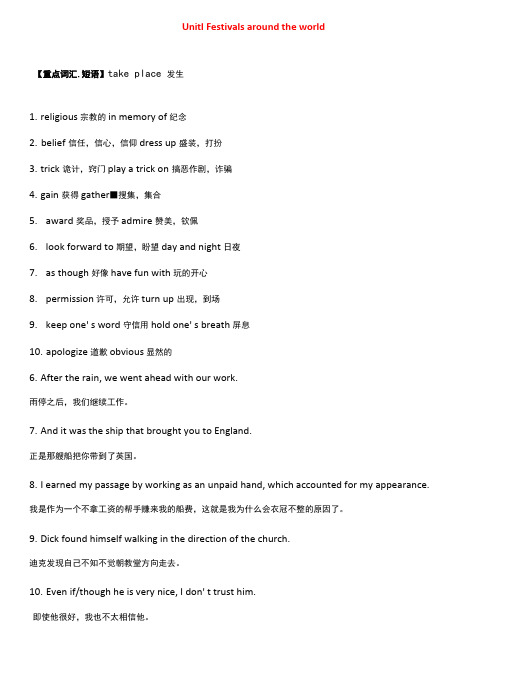
Unitl Festivals around the world【重点词汇.短语】take place 发生1.religious 宗教的in memory of 纪念2.belief信任,信心,信仰dress up盛装,打扮3.trick诡计,窍门play a trick on搞恶作剧,诈骗4.gain获得gather■搜集,集合5.award奖品,授予admire赞美,钦佩6.look forward to 期望,盼望day and night 日夜7.as though 好像have fun with 玩的开心8.permission 许可,允许turn up出现,到场9.keep one' s word 守信用hold one' s breath 屏息10.apologize 道歉obvious 显然的6.After the rain, we went ahead with our work.雨停之后,我们继续工作。
7.And it was the ship that brought you to England.正是那艘船把你带到了英国。
8.I earned my passage by working as an unpaid hand, which accounted for my appearance. 我是作为一个不拿工资的帮手赚来我的船费,这就是我为什么会衣冠不整的原因了。
9.Dick found himself walking in the direction of the church.迪克发现自己不知不觉朝教堂方向走去。
10.Even if/though he is very nice, I don' t trust him.即使他很好,我也不太相信他。
【语法总结】名词性从句在句子中起名词作用的句子叫名词性从句(Noun Clauses),名词性从句的功能相当于名词词组,它在复合句中能担任主语、宾语、表语、同位语等,因此根据它在句中不同的语法功能,名词性从句又可分别称为主语从句、宾语从句、表语从句和同位语从句。
高中英语人教版必修三第五单元语法:同位语从句

高中英语人教版必修三第五单元语法:同位语从句Unit 5 Canada--The True North同位语从句(The Appositive Clause)(一)同位语同位语:一个名词(或其它形式)对另一名词或代词进行说明,这个名词(或其它形式)就是同位语。
1.W e Chinese people are brave and hardworking.(名词做同位语)我们中国人是勇敢勤劳的。
2.Y esterday I met Tom ,a friend of my brother’s.(短语做同位语)昨天我遇到汤姆,他是我哥哥的朋友。
3.W e heard the news that our team had won .我们听到了我们队赢的消息。
(句子做同位语)(二)同位语从句:在复合句中,用作同位语的从句,叫同位语的从句。
它一般跟在某些名词(fact ,idea, news , possibility ,promise等)的后面,用以说明或解释前面的名词。
eg The news that our team football team won the match was encouraging.我们足球队赢了比赛的消息令人鼓舞。
(三)同位语从句引导词连词:that(无词义),whether(是否)连接代词who/ who(谁), whose(谁的),what (什么),which (哪一个)连接副词when(什么时候),where(哪里),why (为什么)how(如何)1.that(1)that引导同位语从句,本身无词义,在从句中不做成分,但不可省略。
We heard the news that our team had won .我们听到了我们队赢的消息。
(2)that引导同位语从句常用句式:1)There is no doubt that+同位语从句。
毫无疑问...There is no doubt that our environment isbecoming worse and worse.毫无疑问我们的环境变得越来越糟糕。
新人教版必修三英语第五单元语法点同位语从句

3 同位语从句的引导词
(1) 从句不缺 从句不缺句子成分,表示是否— • 1. He told me the news that our team had (3)won t只he用mwahtcehth. er
(4•)2y(w.o3Yuh)oaluo从t,vmwe句uhm缺seetr.少ea,nw成swh分eern,,thw疑ehqy问,uhe含sotw义ion—wwhheoth, ewr hom, • 3. They have no idea where he has gone. (5•)4注. T意he:priof,bwlehmichho不w能th引ey导ca同n b位a语lan从ce句life (6)a同nd位st语ud从y i句s n语ot序se:tt陈led述y语et.序---引导词+主+谓 (7) e.g. They have no idea where he has gone.
A which B that C what D whatever 2 The news __A__ he told us is exciting.
Which of the following is wrong?
A what B \ C which D that
Choose the best answer
is co-operative and eager to learn from
others.
A. which
B. that
C. when
D. why
7. Do you have any idea ________ is actually going on in the classroom?
A.that C.as
A. that B. which C. when D. what
人教课标版高中英语必修3名师语法:同位语从句
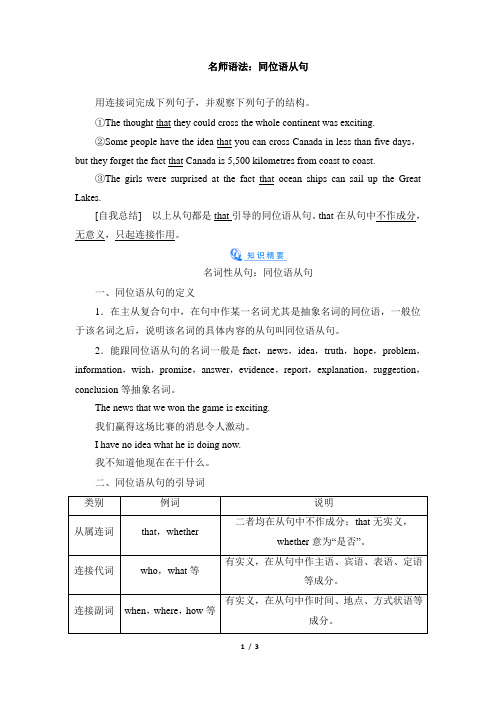
名师语法:同位语从句用连接词完成下列句子,并观察下列句子的结构。
①The thought that they could cross the whole continent was exciting.②Some people have the idea that you can cross Canada in less than five days,but they forget the fact that Canada is 5,500 kilometres from coast to coast.③The girls were surprised at the fact that ocean ships can sail up the Great Lakes.[自我总结]以上从句都是that引导的同位语从句。
that在从句中不作成分,无意义,只起连接作用。
名词性从句:同位语从句一、同位语从句的定义1.在主从复合句中,在句中作某一名词尤其是抽象名词的同位语,一般位于该名词之后,说明该名词的具体内容的从句叫同位语从句。
2.能跟同位语从句的名词一般是fact,news,idea,truth,hope,problem,information,wish,promise,answer,evidence,report,explanation,suggestion,conclusion等抽象名词。
The news that we won the game is exciting.我们赢得这场比赛的消息令人激动。
I have no idea what he is doing now.我不知道他现在在干什么。
二、同位语从句的引导词类别例词说明从属连词that,whether 二者均在从句中不作成分;that无实义,whether意为“是否”。
连接代词who,what等有实义,在从句中作主语、宾语、表语、定语等成分。
高中英语知识点归纳同位语从句的用法
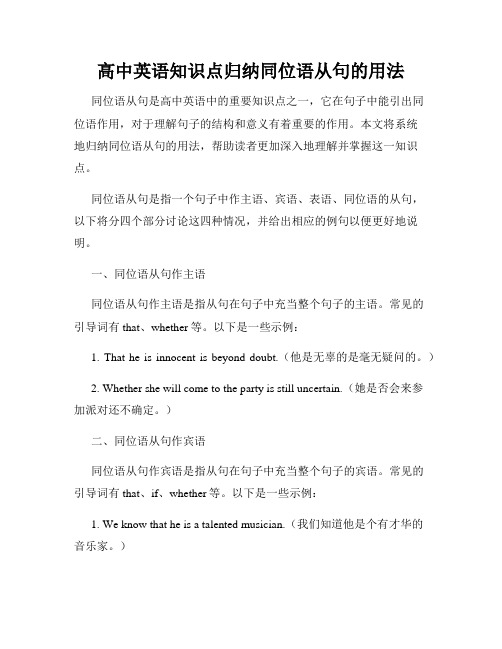
高中英语知识点归纳同位语从句的用法同位语从句是高中英语中的重要知识点之一,它在句子中能引出同位语作用,对于理解句子的结构和意义有着重要的作用。
本文将系统地归纳同位语从句的用法,帮助读者更加深入地理解并掌握这一知识点。
同位语从句是指一个句子中作主语、宾语、表语、同位语的从句,以下将分四个部分讨论这四种情况,并给出相应的例句以便更好地说明。
一、同位语从句作主语同位语从句作主语是指从句在句子中充当整个句子的主语。
常见的引导词有that、whether等。
以下是一些示例:1. That he is innocent is beyond doubt.(他是无辜的是毫无疑问的。
)2. Whether she will come to the party is still uncertain.(她是否会来参加派对还不确定。
)二、同位语从句作宾语同位语从句作宾语是指从句在句子中充当整个句子的宾语。
常见的引导词有that、if、whether等。
以下是一些示例:1. We know that he is a talented musician.(我们知道他是个有才华的音乐家。
)2. I don't know if/whether he can solve the problem.(我不知道他是否能解决这个问题。
)三、同位语从句作表语同位语从句作表语是指从句在句子中充当整个句子的表语。
同位语从句常见的引导词有that、whether等。
以下是一些示例:1. His hope is that he can go abroad to study.(他的希望是能够出国留学。
)2. The truth is whether you like it or not.(事实是无论你喜欢与否。
)四、同位语从句作同位语同位语从句作同位语是指从句在句子中充当名词性的同位语。
常见的引导词有that、whether等。
以下是一些示例:1. The question is whether we should take immediate action.(问题是我们是否应该立即采取行动。
人教版高中英语必修3 Unit5 单元语法详解:同位语从句

Unit5 单元语法详解:同位语从句【语境展示】观察下面句子,并试着归纳同位语从句的用法要点。
1. There is a general belief that things will soon get better.2. The fact that we didn't win when we were so close is very disappointing.3. There is not much hope that they are still alive.4. There's always a possibility that he might go back to Seattle.5. The thought that I might not have a job next year is a bit troubling.6. I made a promise that I wouldn't tell anyone about that.7. I'm not sure where my necklace is, but I have a pretty good idea who took it.8. She had her doubts whether he would help her.9. She doesn't have any idea where they've gone.10. I have no idea why the television isn't working.11. Bob got the news from Mary that the sports meeting had been put off.12. Word came that our duties would be changed.【自我归纳】在主从复合句中,用作同位语的从句,叫同位语从句(句1-句12)。
高中英语同位语从句知识点整理

高中英语同位语从句知识点整理1.定义:用作同位语的从句叫做同位语从句。
2.用法:同位语从句的先行词多为fact,news,idea,thought,question,reply,report,remark等,关系词多用附属连词that 。
比如:Theywereallverymuchworriedoverthefactthatyouweresick.对你患病这件事,他们都很忧虑。
wheredidyougettheideathatIcouldnotcome你在哪儿听闻我不可以来注:同位语从句有时由附属连词whether 指引。
比如: Ihavenoideawhetherhe'llcomeornot.我不知道他能否来。
连接代词who,which,what和连接副词where,when,why,how亦可指引同位语从句。
比如:Thequestionwhoshoulddotheworkrequiresconsideration.谁该干这项工作,这个问题需要考虑。
Itisaquestionhowhedidit.那是一个他怎样做了此事的问题。
注:. 一些表示“建议、命令、要求”的名词后所跟的同位语从句中,谓语动词用虚构语气should+ 动词原形表示。
should 可省。
比如:Thisisouronlyrequestthatthisbesettledassoonaspossible. 这就是我们独一的恳求:赶快解决这个问题。
2.指引词 that 在同位语从句中不作句子成分;而在定语从句中必作句子成分,是从句所修饰的词的代替词。
比如:Thefactthatthechinesepeopleinventedthecompassisknow ntoall.中国人发明指南针这个事实是尽人皆知的。
(同位语从句)Thefactthatwetalkedaboutisveryimportant.我们谈论的这个事实很重要。
人教版高中英语必修三单元五Book 3 Unit5语法: 同位语从句
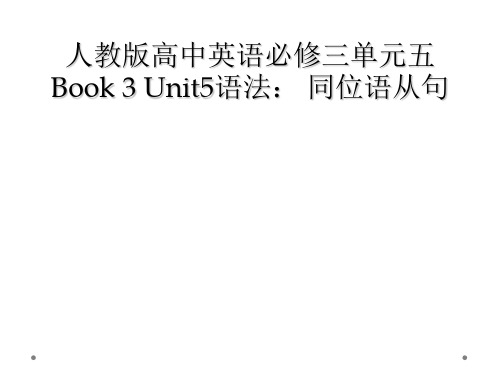
老师们和同学们对我很友好。 Teachers as well as classmates are friendly to me.
同位语从句
一、定义 二、可以跟同位语从句的名词 三、引导词 四、注意用法 1、分隔式同位语从句; 2、同位语从句的虚拟语气; 3、doubt/no doubt后的同位语从句引导 词的选择。
dream A they will always live
a peaceful life.
A. that B. what C. which D. where
thousands of 成千上万的
hundred, thousand, million,
billion, score(20), dozen(12)之前
有具体的数字时,不论后面有无of, 词尾都不加s。hundred
three
students
3h0un0d名re学d生
three
of them
成百上千只山羊 hundreds of goats
两百只山羊 two hundred goats
as well =too, “也”,置于句尾 as well as用于连接连个并列的成分, 置于句中
3、名词doubt(怀疑)后的同位语从句用 whether引导;
no doubt(毫无疑问)后的同位语从句用 that引导。
I have some doubt whether they can complete the task on time.
我怀疑他们是否能按时完成这项任务。
There is no doubt that Lily will keep her promise.
人教版高中英语必修三知识点归纳总结(详细版)
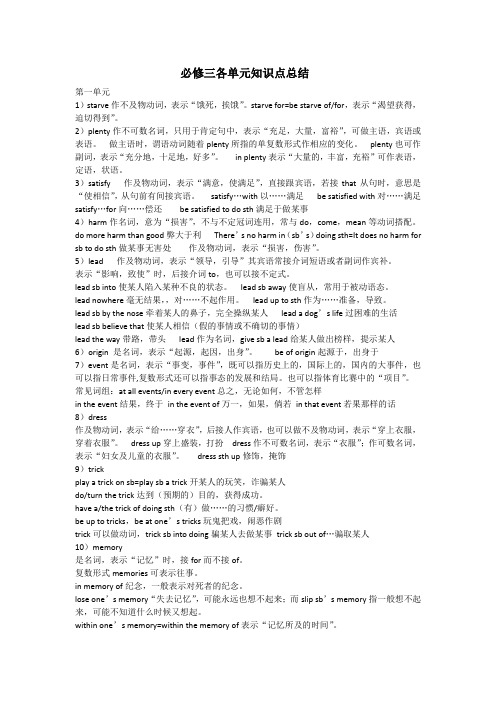
必修三各单元知识点总结第一单元1)starve作不及物动词,表示“饿死,挨饿”。
starve for=be starve of/for,表示“渴望获得,迫切得到”。
2)plenty作不可数名词,只用于肯定句中,表示“充足,大量,富裕”,可做主语,宾语或表语。
做主语时,谓语动词随着plenty所指的单复数形式作相应的变化。
plenty也可作副词,表示“充分地,十足地,好多”。
in plenty表示“大量的,丰富,充裕”可作表语,定语,状语。
3)satisfy 作及物动词,表示“满意,使满足”,直接跟宾语,若接that从句时,意思是“使相信”,从句前有间接宾语。
satisfy…with以……满足be satisfied with对……满足satisfy…for向……偿还be satisfied to do sth满足于做某事4)harm作名词,意为“损害”,不与不定冠词连用,常与do,come,mean等动词搭配。
do more harm than good弊大于利There’s no harm in(sb’s)doing sth=It does no harm for sb to do sth做某事无害处作及物动词,表示“损害,伤害”。
5)lead 作及物动词,表示“领导,引导”其宾语常接介词短语或者副词作宾补。
表示“影响,致使”时,后接介词to,也可以接不定式。
lead sb into使某人陷入某种不良的状态。
lead sb away使盲从,常用于被动语态。
lead nowhere毫无结果,,对……不起作用。
lead up to sth作为……准备,导致。
lead sb by the nose牵着某人的鼻子,完全操纵某人lead a dog’s life过困难的生活lead sb believe that使某人相信(假的事情或不确切的事情)lead the way带路,带头lead作为名词,give sb a lead给某人做出榜样,提示某人6)origin 是名词,表示“起源,起因,出身”。
必修三unit 5 同位语从句共43页文档

41、学问是异常珍贵的东西,从任何源泉吸 收都不可耻。——阿卜·日·法拉兹
42、只有在人群中间,才能认识自 己。——德国
43、重复别人所说的话,只需要教育; 而要挑战别人所说的话,则需要头脑。—— 玛丽·佩蒂博恩·普尔
必修三unit 5 同位语从句
36、如果我们国家的法律中只有某种 神灵, 而不是 殚精竭 虑将神 灵揉进 宪法, 总体上 来说, 法律就 会更好 。—— 马克·吐 温 37、纲纪废弃之日,便是暴政兴起之 时。— —威·皮 物特
38、若是没有公众舆论的支持,法律 是丝毫 没有力 量的。 ——菲 力普斯 39、一个判例造Байду номын сангаас另一个判例,它们 迅速累 聚,进 而变成 法律。 ——朱 尼厄斯
44、卓越的人一大优点是:在不利与艰 难的遭遇里百折不饶。——贝多芬
45、自己的饭量自己知道。——苏联
【高中英语】高中英语知识点:同位语从句
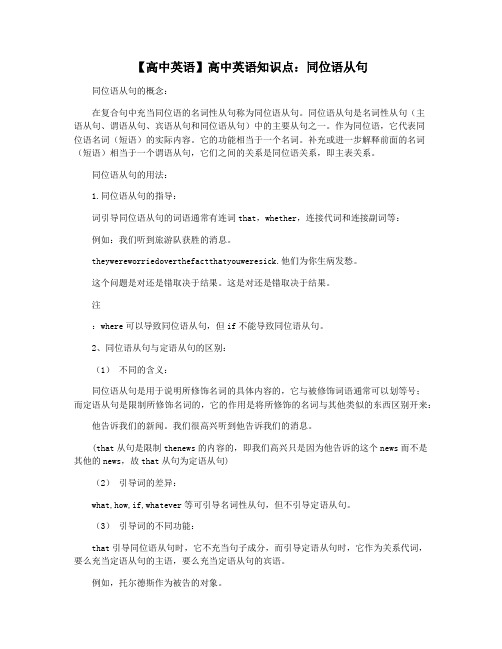
【高中英语】高中英语知识点:同位语从句同位语从句的概念:在复合句中充当同位语的名词性从句称为同位语从句。
同位语从句是名词性从句(主语从句、谓语从句、宾语从句和同位语从句)中的主要从句之一。
作为同位语,它代表同位语名词(短语)的实际内容。
它的功能相当于一个名词。
补充或进一步解释前面的名词(短语)相当于一个谓语从句,它们之间的关系是同位语关系,即主表关系。
同位语从句的用法:1.同位语从句的指导:词引导同位语从句的词语通常有连词that,whether,连接代词和连接副词等:例如:我们听到旅游队获胜的消息。
theywereworriedoverthefactthatyouweresick.他们为你生病发愁。
这个问题是对还是错取决于结果。
这是对还是错取决于结果。
注:where可以导致同位语从句,但if不能导致同位语从句。
2、同位语从句与定语从句的区别:(1)不同的含义:同位语从句是用于说明所修饰名词的具体内容的,它与被修饰词语通常可以划等号;而定语从句是限制所修饰名词的,它的作用是将所修饰的名词与其他类似的东西区别开来:他告诉我们的新闻。
我们很高兴听到他告诉我们的消息。
(that从句是限制thenews的内容的,即我们高兴只是因为他告诉的这个news而不是其他的news,故that从句为定语从句)(2)引导词的差异:what,how,if,whatever等可引导名词性从句,但不引导定语从句。
(3)引导词的不同功能:that引导同位语从句时,它不充当句子成分,而引导定语从句时,它作为关系代词,要么充当定语从句的主语,要么充当定语从句的宾语。
例如,托尔德斯作为被告的对象。
(4)被修饰词语的区别:同位语从句修饰数量有限的名词,如希望、愿望、想法、新闻、事实、承诺、意见、建议、真理等,而定语从句修饰范围广泛的名词。
另外,when和where引导定语从句时,通常只修饰表示时间和地点的名词,而它们引导同位语从句时却不一定;又如why引导定语从句,它通常只修饰名词thereason,而它引导同位语从句时则不一定:我永远不会忘记我在那里的日子。
- 1、下载文档前请自行甄别文档内容的完整性,平台不提供额外的编辑、内容补充、找答案等附加服务。
- 2、"仅部分预览"的文档,不可在线预览部分如存在完整性等问题,可反馈申请退款(可完整预览的文档不适用该条件!)。
- 3、如文档侵犯您的权益,请联系客服反馈,我们会尽快为您处理(人工客服工作时间:9:00-18:30)。
人教版高中英语必修三知识点梳理重点题型(常考知识点)巩固练习同位语从句概念引入:我们已经学习了名词性从句中的其它三个从句:主语从句、宾语从句和表语从句,本单元我们将较详细地了解一下同位语从句的用法,并梳理名词性从句的几个常用连接词使用时的需注意的一些方面。
下面先研究一下这些句子:1 I have a dream that one day, all roads will be made plain.我梦想着总有一天所有的道路都是平坦的。
2 We hold this truth to be self-evident that all men are created equal.我们认为这些真理都是不言自明的,所有的人生来都是平等的。
3 Some people hold the opinion that the Internet is a curse.有些人持这种观点,互联网是一种诅咒。
4 Museums play a role of education for the simple reason that they provide people with agood opportunity to have a deeper understanding of their own country's tradition and cultures. 博物馆发挥教育的作用,原因很简单,他们为人们提供一个很好的机会,对自己国家的传统和文化有更深的了解。
这些句子中都含有一个同位语从句,你找到了吗?而且都是that引导的从句,说明前面的名词,如句1中的dream,句2中的truth。
语法讲解同位语从句1. 在复合句中用作同位语的从句叫同位语从句。
它一般跟在某些名词后面,用以说明该名词表示的具体内容。
I heard the news that our team had won.我听到了我们队获胜的消息。
Where did you get the idea that I could not come?你在哪儿听说我不能来?2. 可以跟同位语从句的名词通常有news,idea,fact,promise,question,doubt,thought,hope,message,suggestion,words(消息),possibility等(一般的抽象名词都可用)。
I’ve come from Mr. Wang with a message that he won’t be able to see you this afternoon.我从王先生那里来,他让我告诉你他今天下午不能来看你了。
(2015 陕西高考) There is the belief that, if you arrive at an appointment late, you will be considered important. This is a mistaken view. 有这样一种观点:如果你约会迟到,别人会认为你很重要。
这是个错误想法。
3. 英语中引导同位语从句的词通常有连词that,whether,连接代词what,who。
连接副词how ,when ,where等。
(注:if ,which 不能引导同位语从句。
)He must answer the question whether he agrees to it or not.他必须回答他是否同意这样一个问题。
4. 在suggestion,advice,request,order等意为“建议;命令;要求”的名词后,同位语从句中的谓语动词通常用“should +动词原形”的虚拟语气结构,句中的should可以省略。
Our teacher gave us some advice how we (should)use the computer.老师给我们提出了一些如何使用电脑的建议。
There was a suggestion that Brown should be dropped from the team.有一项建议是布朗应该离队。
5. 有时同位语从句可以不紧跟在说明的名词后面,而被别的词隔开。
The thought came to her that maybe she had left the door open when she left home.她突然想起可能在她离开家时没把门关上。
同位语从句-引导词同位语从句的引导词,引导同位语从句的词语通常有连词that,whether,连接代词和连接副词等。
1. 连词that引导同位语从句(注:that不能省略)The idea that you can do this work well without thinking is quite wrong.你认为不动脑筋就能做好这件工作的想法是完全错误的。
(作idea的同位语)注意:引导同位语从句的连词that通常不省略,但在非正式文体中也可以省去。
He grabbed his suitcase and gave the impression he was boarding the Tokyo plane.他拿起了手提箱,给人的印象是他要登上飞往东京的飞机了。
2. 连词whether引导同位语从句(注:if不能引导同位语从句)The question whether we should call in a specialist was answered by the family doctor.我们是否请专家由家庭医生来定。
3.连接代词what ,who ,whom ,whose,引导同位语从句1) I have no idea what size shoes she wears.我不知道她穿几号的鞋。
(what作定语)2) The question who will take his place is still not clear. (who作主语)4. 连接副词引导同位语从句连接副词when ,where ,how ,whyWe haven’t yet settled the question where we are going to spend our summer vacation.到哪儿去度暑假,这个问题我们还没有决定。
【名词性从句(二),367116,同位语从句】同位语从句与定语从句的区别1.意义的不同同位语从句是用于说明所修饰名词的具体内容的,与被修饰词通常可以划等号;而定语从句是限制所修饰名词的,其作用是将所修饰的名词与其他类似的东西区别开:We are glad at the news that he will come. 听到他会来的消息我很高兴。
(that从句说明news的内容,是同位语从句)We are glad at the news that he told us. 听到他告诉我们的消息我们很高兴。
(that从句说明是哪一天消息,是定语从句)2. 引导词的不同what, how, if, whatever 等可引导名词性从句,但不引导定语从句。
3. 被修饰词语的区别同位语从句所修饰的名词比较有限,通常有hope, wish, idea, news, fact, promise, opinion, suggestion, truth等,而定语从句所修饰的名词则非常广泛。
4. 引导词的功能上的不同that引导同位语从句时,不充当句子成分;而引导定语从句时,作为关系代词在定语从句中作主语或宾语。
如上例中that he told us中的that就充当told的宾语。
5. 引导词when,where,why1)when和where 引导定语从句时,通常只修饰表示时间和地点的名词,代替先行词在从句中作时间或地点状语;而引导同位语从句时却不一定,在从句中表示“在什么时候”和“在哪里”。
I have no idea when they will come. 我不知道他们什么时候会来。
I’ll never forget the days when I lived there.我不会忘记我住在那里的日子。
2)why引导定语从句,通常只修饰名词the reason,在从句中代替作原因状语;而why引导同位语从句时则不一定,译成“为什么”。
Can you tell me the reason why you won’t go there?你能告诉我你不愿意去那里的原因。
He repeated the question again why I wouldn’t go there.他又重复了那个问题:为什么我不愿意去那里。
3)引导定语从句时,它们叫做关系副词,在从句中充当状语,可以转换成"介词+关系代词"的形式;引导同位语从句时,它们叫做连接副词,在从句中充当状语,但不能转换成"介词+关系代词"的形式。
例如:①I will never forget the day when I joined the army.我永远也忘不了我参军的那一天。
②We have no idea when she was born.我们不知道她是什么时候出生的。
在句①中,划线部分是定语从句,when在从句中作状语,可以转换成on which的形式;在句②中,划线部分是同位语从句,when在从句中充当状语,但不能转换成“介词+关系代词”的形式。
③This is the house where I lived two years ago.这是我两年前住的房子。
④He put forward to the question where the meeting would be held.他提出会议将在哪里举行的问题。
在句③中,划线部分是定语从句,where在从句中作状语,可以转换成in which的形式;在句④中,划线部分是同位语从句,where在从句中充当状语,但不能转换成"介词+关系代词"的形式。
⑤This is the reason why she will not attend the meeting.这就是她不会参加那个会议的原因。
⑥The teacher had no idea why Jack was absent.在句⑤中,划线部分是定语从句,why在从句中作状语,它可以转换成for which的形式;在句⑥中,划线部分是同位语从句,why在从句中充当状语,但不能转换成“介词+关系代词”的形式。
6. 引导词who,whom①The boy who is playing football is my classmate.正踢球的男孩是我的同学。
